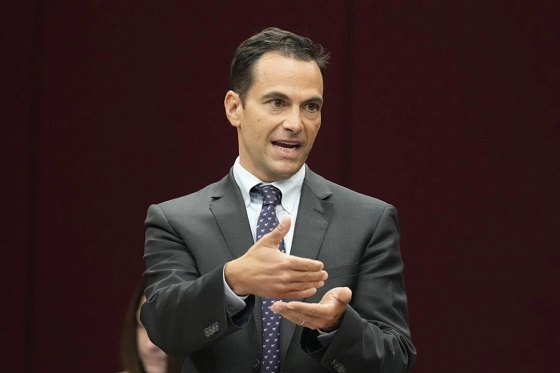National Entertainment
Gloria Vanderbilt, heiress, jeans queen, dies at 95

NEW YORK — Gloria Vanderbilt, the intrepid heiress, artist and romantic who began her extraordinary life as the “poor little rich girl” of the Great Depression, survived family tragedy and multiple marriages and reigned during the 1970s and ’80s as a designer jeans pioneer, died Monday at the age of 95.
Vanderbilt was the great-great-granddaughter of financier Cornelius Vanderbilt and the mother of CNN newsman Anderson Cooper, who announced her death via a first-person obituary that aired on the network Monday morning.
Cooper said Vanderbilt died at home with friends and family at her side. She had been suffering from advanced stomach cancer, he noted.
“Gloria Vanderbilt was an extraordinary woman, who loved life, and lived it on her own terms,” Cooper said in a statement. “She was a painter, a writer, and designer but also a remarkable mother, wife, and friend. She was 95 years old, but ask anyone close to her, and they’d tell you, she was the youngest person they knew, the coolest, and most modern.”
Her life was chronicled in sensational headlines from her childhood through four marriages and three divorces. She married for the first time at 17, causing her aunt to disinherit her. Her husbands included Leopold Stokowski, the celebrated conductor, and Sidney Lumet, the award-winning movie and television director. In 1988, she witnessed the suicide of one of her four sons.
Tributes online came from celebrities and fans of her clothes alike. Alyssa Milano called her “an incredible woman,” Dana Delany said she treasures one of her paintings and one Twitter user mourned by remembering the canary Vanderbilt jeans she wore in junior high school.
Vanderbilt was a talented painter and collagist who also acted on the stage (“The Time of Your Life” on Broadway) and television (“Playhouse 90,” ”Studio One,” ”Kraft Theater,” ”U.S. Steel Hour”). She was a fabric designer who became an early enthusiast for designer denim. The dark-haired, tall and ultra-thin Vanderbilt partnered with Mohan Murjani, who introduced a $1 million advertising campaign in 1978 that turned the Gloria Vanderbilt brand with its signature white swan label into a sensation.
At its peak in 1980, it was generating over $200 million in sales. And decades later, famous-name designer jeans — dressed up or down — remain a woman’s wardrobe staple.
Vanderbilt wrote several books, including the 2004 chronicle of her love life: “It Seemed Important at the Time: A Romance Memoir,” which drops such names as Errol Flynn, whom she dated as a teenager; Frank Sinatra, for whom she left Stokowski; Marlon Brando and Howard Hughes.
She claimed her only happy marriage was to author Wyatt Cooper, which ended with his death in 1978 at age 50. Son Anderson Cooper called her memoir “a terrific book; it’s like an older ‘Sex and the City.'”
“I’ve had many, many loves,” Vanderbilt told The Associated Press in a 2004 interview. “I always feel that something wonderful is going to happen. And it always does.”
Noting her father’s death when she was a toddler, she said: “If you don’t have a father, you don’t miss it, because you don’t know what it is. It was really only when I married Wyatt Cooper that I understood what it was like to have a father, because he was just an extraordinary father.”
In 2016, Vanderbilt and Anderson Cooper appeared together in the HBO documentary “Nothing Left Unsaid.”
Gloria Laura Madeleine Sophie Vanderbilt was born in 1924, a century after her great-great-grandfather started the family fortune, first in steamships, later in railroads. He left around $100 million when he died in 1877 at age 82.
Her father, Reginald Claypoole Vanderbilt, was 43, a gambler and boozer dying of liver disease when he married Gloria Morgan, 19, in 1923. Their daughter was 1 when Vanderbilt died in 1925, having gone through $25 million in 14 years.
Beneficiary of a $5 million trust fund, Vanderbilt became the “poor little rich girl” in 1934 at age 10 as the object of a custody fight between her globe-trotting mother and matriarchal aunt.
The aunt, Gertrude Vanderbilt Whitney, 59, who controlled $78 million and founded the Whitney Museum of American Art, won custody of her niece.
A shocked judge had closed the trial when a maid accused the child’s mother of a lesbian affair with a member of the British royal family. The fight was chronicled in the
The “poor little rich girl” nickname “bothered me enormously,” Vanderbilt told The Associated Press in 2016. “I didn’t see any of the press — the newspapers were kept from me. I didn’t know what it meant. I didn’t feel poor and I didn’t feel rich. It really did influence me enormously to make something of my life when I realized what it meant.”
After spending the next seven years on her aunt’s Long Island estate, Vanderbilt went to Hollywood. She dated celebrities and declared she would marry Hughes. Instead, the 17-year-old wed Hughes’ press agent, Pasquale di Cicco, prompting her aunt to cut Gloria out of her will.
Vanderbilt came into her own $5 million trust fund in 1945 at age 21. She also divorced Di Cicco, whom she said had beaten her often, and the next day married the 63-year-old Stokowski. The marriage to the conductor lasted 10 years and produced two sons, Stanislaus and Christopher.
After her marriage broke up, Vanderbilt found herself embroiled in another custody case, this time as the mother. During the closed hearings, Stokowski accused Vanderbilt of spending too much time at parties and too little with the boys. She accused him of tyrannizing his sons and said he really was 85, and not 72 as he claimed.
Justice Edgar Nathan Jr. gave Vanderbilt full-time custody. But he commented that the court had wasted a month on “the resolution of problems which mature, intelligent parents should be able to work out for themselves.”
Vanderbilt married Lumet in 1956 and lived with him and her children in a 10-room duplex penthouse on Gracie Square. She divorced Lumet and married Cooper in 1963.
Their elder son, Carter, a Princeton graduate and editor at American Heritage, killed himself in 1988 at age 23, leaping from his mother’s 14th floor apartment as she tried to stop him. Police said he had been treated for depression and friends said he was despondent over a break-up with a girlfriend. Vanderbilt says in “Nothing Left Unsaid” that she contemplated following him, but the thought of how it would devastate Anderson stopped her.
After her success in designer jeans, Vanderbilt branched out into other areas, including shoes, scarves, table and bed linens, and china, through her company, Gloria Concepts. In 1988 Vanderbilt joined the designer fragrance market with her signature “Glorious.”
By the late 1980s, Vanderbilt sold the name and licenses for the brand name “Gloria Vanderbilt” to Gitano, who transferred it to a group of private investors in 1993. More recently, her stretch jeans have been licensed through Jones Apparel Group Inc., which acquired Gloria Vanderbilt Apparel Corp. in 2002 for $138 million.
Vanderbilt became the target of a swindle in the late 1970s and early ’80s when she made her psychiatrist and a lawyer associates in her business affairs. A court held that the two had looted millions from Vanderbilt’s bank accounts.
Vanderbilt also made headlines in 1980 when she filed, but later dropped, a discrimination complaint against the posh River House apartments, which had rejected her bid to buy a $1.1 million duplex. She claimed the board was worried that black singer Bobby Short, who appeared with her on TV commercials, might marry her.
In 2009, the 85-year-old Vanderbilt penned a new novel, “Obsession: An Erotic Tale,” a graphic tale about an architect’s widow who discovers a cache of her husband’s letters that reveal his secret sex life.
In an interview with The New York Times, she said she wasn’t embarrassed about the explicitness of her new book, saying: “I don’t think age has anything to do with what you write about. The only thing that would embarrass me is bad writing, and the only thing that really concerned me was my children. You know how children can be about their parents. But mine are very intelligent and supportive.”
Ula Ilnytzky, The Associated Press
Alberta
Province adds $335 million over three years to attract more investment from Hollywood

Action! for Alberta’s film and television industry
Alberta’s screen-based sector has momentum, and Alberta’s government is helping to make the province a magnet for the job-creating film and television industry.
In 2020, Alberta’s government launched the Film and Television Tax Credit, causing the province’s film and television industry to grow in size and reputation. Since then, Alberta has attracted 129 productions with a total production value of $1.7 billion. This growth has resulted in approximately 9,000 direct and indirect jobs for Albertans.
To keep this momentum going, Alberta’s government continues to make changes to the program and increase investment in it. One year after the tax credit was launched, the cap was raised, resulting in a doubling of the province’s film and television sector. Now, Alberta’s government is increasing its investment to a total of $335 million over three years to continue attracting the attention and investment dollars of Hollywood.
“Alberta is experiencing exponential growth in our film and television sector, and we are well on our way to becoming a top Canadian jurisdiction for producers from around the world. Since the introduction of the Film and Television Tax Credit, the film and television sector in Alberta has doubled. Productions reach every part of Alberta – big cities, small towns and rural locations – and use local resources, businesses, accommodations and contractors, supporting thousands of jobs.”
As the province’s film and television industry grows, so does the quality and number of Alberta-made productions. To help grow and promote local talent and productions, Alberta’s government is also doubling the funding to the Alberta Made Screen Industries Program. This funding will support local producers and attract productions from around the world to set up shop in Alberta.
“Alberta-made film and television productions showcase Alberta’s unique culture, breathtaking landscapes and stories to audiences across the globe. We are increasing our support to smaller productions because they provide a unique Alberta-made training ground for emerging talent and create local, highly skilled workers in the sector.”
The Film and Television Tax Credit and Alberta Made Screen Industries Program work together to showcase the beauty and diversity of Alberta, create jobs, diversify the economy and support hospitality, service and tourism in the province. These targeted incentives to the film and television industries are helping to ensure Alberta remains the economic engine of Canada for years to come and the next film and television hub.
“The tax credit is central to the success of the industry. This is a competitive industry globally, and here in Alberta we’re fortunate we had the cap removed. Now we can see productions with budgets from $100,000 to well over $100 million. Now that we have a robust production environment, there are more opportunities for people to have well-paying creative jobs.”
“The Alberta government has provided supports for the film and television industry that provide certainty. It gives us more flexibility in how we’re moving forward in our film and television work and the way that we’re running our businesses.”
“Seeing the increase to the Alberta Made Production Grant in the last budget has been fantastic. It will help grow the local industry, which means so much to local performers because that’s where they build their resumés. It allows them to be a working performer, and not take side jobs or a day job somewhere else, and really focus on their craft.”
Quick facts
- According to Statistics Canada data:
- Every $1 million of production activity in the screen-based production sector creates about 13 Alberta jobs.
- Every $1 million of government investment under the Film and Television Tax Credit program is expected to support about 85 Alberta jobs.
- The film and television industry is experiencing significant growth nationally and globally.
- Every year, Alberta graduates more than 3,000 creative industry professionals from its post-secondary institutions.
- The production workforce has grown 71 per cent from 2017, or by about 4,000 workers across all positions.
- Alberta’s Film and Television Tax Credit supports medium- and large-scale productions with costs over $499,999 through a refundable tax credit on eligible Alberta production and labour costs to corporations that produce films, television series and other eligible screen-based productions.
- The Alberta Made Production Grant supports productions with a budget of up to $499,999.
- The Alberta Made Screen Industries Program, through the Alberta Made Production Grant, supports smaller productions that do not qualify for the tax credit, covering 25 per cent of eligible Alberta production costs to a maximum of $125,000.
- Every $1 investment in the Alberta Made Production Grant program generates an additional $4 in economic return.
Alberta
Edmonton to host “Road to the JUNOS Concert Series” leading up to Juno Awards week

From Explore Edmonton
Road to The JUNOS Concert Series Builds Excitement to JUNO Week.
Access and Diversity Key for Fans and Artists.
The JUNOS 2023 Host Committee is excited to announce an Edmonton-based concert series, titled Road to The JUNOS, as a lead-up to The 52nd Annual JUNO Awards Broadcast and JUNO Week from March 9-13.
The concert series will be set in small, intimate venues around Edmonton and feature local and regional artists who one day may end up on the JUNOS stage. Road to The JUNOS is a collaboration between the JUNOS 2023 Edmonton Host Committee, CBC Music and Explore Edmonton. It aims to provide excitement and create momentum leading into Canada’s biggest celebration of music.
The 10-show concert series will run from Monday, February 6 through Tuesday, February 28 at local venues in Edmonton. Of note, the artists playing these events come from a wide variety of backgrounds and genres and offer an opportunity to see some of Canada’s newest and most exciting talent. Fans can be a part of an intimate JUNOS concert with an affordable advance ticket price of only $10.

Road to The JUNOS is possible thanks in part to federal funding through PrairiesCan’s Tourism Relief Fund. This Fund is positioning Canada as a destination of choice for domestic and international travel. PrairiesCan administers the Fund in Alberta.
“Edmonton is a vibrant and dynamic cultural hub and our government’s support for Road to The JUNOS will bring that experience to visitors from across Canada and around the globe. Through the Tourism Relief Fund and our partnership with organizations such as Explore Edmonton, communities across Canada will capitalize on the jobs and economic activity generated through Edmonton’s growing tourism industry.”
– The Honourable Dan Vandal, Minister for PrairiesCan
“Road to The JUNOS is an important step in positioning Edmonton as an all-season destination and celebrating our community’s business and arts districts. I’m proud to see our government supporting Edmonton to build on its leadership in arts and culture while strengthening local tourism activity that benefits businesses in our city.”
– The Honourable Randy Boissonnault, Minister of Tourism and Associate Minister of Finance
“Road to The JUNOS is an exciting opportunity to grow Alberta’s music industry, showcasing local talent to visitors from all parts of Canada. The Alberta government is proud to support this series of concerts that features Alberta’s talent on stage as well as the venues, promoters and other music professionals.”
– The Honourable Jason Luan, Alberta Minister of Culture
“Canada has a long history of producing exceptionally talented musicians. The Road to The JUNOS concert series hopes to help give a platform to some of our up-and-coming artists and audiences a chance to say ‘we saw them when’.”
– Aimée Hill, co-chair, 2023 Host Committee
“Explore Edmonton is proud to support The JUNO Awards in March and we are delighted to be a part of this grassroots concert series. Promoting our local music venues, supporting talented Canadian musicians, and giving Edmontonians quality music experiences at an affordable price is such an important piece to the whole JUNOS experience. And we get to show off a little for the rest of Canada!”
– Traci Bednard, CEO of Explore Edmonton
The JUNOS Experience starts here. For more information and to buy tickets, visit: https://edmonton.junoawards.
-

 Energy15 hours ago
Energy15 hours agoIt should not take a crisis for Canada to develop the resources that make people and communities thrive.
-

 Fraser Institute1 day ago
Fraser Institute1 day agoCourts and governments caused B.C.’s property crisis—they’re not about to fix it
-

 Alberta1 day ago
Alberta1 day agoChatGPT may explain why gap between report card grades and standardized test scores is getting bigger
-

 Alberta23 hours ago
Alberta23 hours agoFederal budget: It’s not easy being green
-

 Education1 day ago
Education1 day agoJohns Hopkins University Announces Free Tuition For Most Students
-

 Energy23 hours ago
Energy23 hours agoA picture is worth a thousand spreadsheets
-

 Business23 hours ago
Business23 hours agoWill Paramount turn the tide of legacy media and entertainment?
-

 Business1 day ago
Business1 day agoParliamentary Budget Officer begs Carney to cut back on spending




